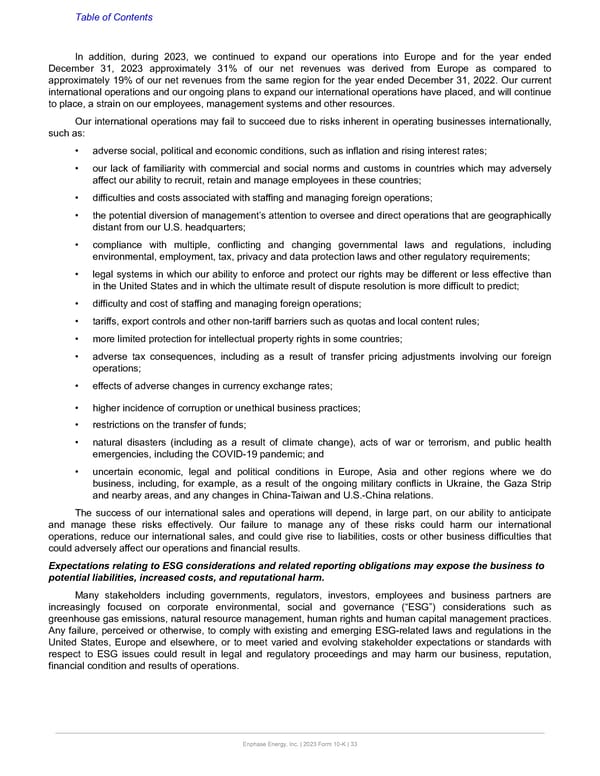Table of Contents In addition, during 2023, we continued to expand our operations into Europe and for the year ended December 31, 2023 approximately 31% of our net revenues was derived from Europe as compared to approximately 19% of our net revenues from the same region for the year ended December 31, 2022. Our current international operations and our ongoing plans to expand our international operations have placed, and will continue to place, a strain on our employees, management systems and other resources. Our international operations may fail to succeed due to risks inherent in operating businesses internationally, such as: • adverse social, political and economic conditions, such as inflation and rising interest rates; • our lack of familiarity with commercial and social norms and customs in countries which may adversely affect our ability to recruit, retain and manage employees in these countries; • difficulties and costs associated with staffing and managing foreign operations; • the potential diversion of management’s attention to oversee and direct operations that are geographically distant from our U.S. headquarters; • compliance with multiple, conflicting and changing governmental laws and regulations, including environmental, employment, tax, privacy and data protection laws and other regulatory requirements; • legal systems in which our ability to enforce and protect our rights may be different or less effective than in the United States and in which the ultimate result of dispute resolution is more difficult to predict; • difficulty and cost of staffing and managing foreign operations; • tariffs, export controls and other non-tariff barriers such as quotas and local content rules; • more limited protection for intellectual property rights in some countries; • adverse tax consequences, including as a result of transfer pricing adjustments involving our foreign operations; • effects of adverse changes in currency exchange rates; • higher incidence of corruption or unethical business practices; • restrictions on the transfer of funds; • natural disasters (including as a result of climate change), acts of war or terrorism, and public health emergencies, including the COVID-19 pandemic; and • uncertain economic, legal and political conditions in Europe, Asia and other regions where we do business, including, for example, as a result of the ongoing military conflicts in Ukraine, the Gaza Strip and nearby areas, and any changes in China-Taiwan and U.S.-China relations. The success of our international sales and operations will depend, in large part, on our ability to anticipate and manage these risks effectively. Our failure to manage any of these risks could harm our international operations, reduce our international sales, and could give rise to liabilities, costs or other business difficulties that could adversely affect our operations and financial results. Expectations relating to ESG considerations and related reporting obligations may expose the business to potential liabilities, increased costs, and reputational harm. Many stakeholders including governments, regulators, investors, employees and business partners are increasingly focused on corporate environmental, social and governance (“ESG”) considerations such as greenhouse gas emissions, natural resource management, human rights and human capital management practices. Any failure, perceived or otherwise, to comply with existing and emerging ESG-related laws and regulations in the United States, Europe and elsewhere, or to meet varied and evolving stakeholder expectations or standards with respect to ESG issues could result in legal and regulatory proceedings and may harm our business, reputation, financial condition and results of operations. Enphase Energy, Inc. | 2023 Form 10-K | 33
 Annual Report Page 32 Page 34
Annual Report Page 32 Page 34